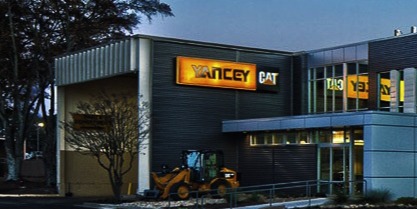
How Yancey Bros. Increased Outbound Sales Communication by 70%

When it comes to scaling business, it’s all about optimizing processes, improving customer service, and adapting supply chain operations to match growth. And over the past century, Yancey Bros. Co. has done just that to become the largest Caterpillar dealer in the United States. From its start in 1914, Yancey Bros. has grown from one shop on Peachtree Street in Atlanta, Georgia, to 38 branches scattered throughout the entire state of Georgia.
Today, managing growth and streamlining operations is the sole task of Yancey Bros.’ Manager of Operational Excellence, Corey Fehribach. For over two years, Corey has focused on collecting data inputs from direct observation in the field combined with numerical data to scale growth by leveling out inefficiencies.
“In a nutshell,” Corey says, “it’s supply chain logistics of aftermarket spare parts, but more specifically, it’s Caterpillar.”
Corey’s goal each day is to eliminate the one off’s of miscommunication and the unknown. In order to maintain efficiencies, there can’t be outlying variables. By isolating these problems and finding solutions, Corey is able to think strategically and create a fluid operation. But with each change to the operations, more questions arise, and Corey must gameplan for the sustainability of growth.
Optimizing call volume
One recent initiative Corey has taken on to manage growth and streamline efficiencies for Yancey Bros. staff and their customers is to incorporate a texting channel to deliver orders and delivery updates.
“…calling every customer when 12,000 orders arrive is not an option, right?” Corey states. “So, you definitely need to cut down that time, and that just bridges that gap.” Corey continues to emphasize that email isn’t the most optimal way to reach construction workers operating equipment out in the field because they aren’t at a desk and don’t have their email open all day. However, what they do have is a cell phone, and they are already using it to send text messages.
Before implementing a text messaging platform for customer communications, Yancey Bros. counter staff was calling an average of 10% of their customers about order and delivery updates. Customers that weren’t receiving these phone calls were finding it more efficient to simply send text messages to staff members’ personal phones. this led to two problems for Corey. One, it, in effect, had staff texting customers at all hours of the day and even on their off days. This was causing burnout and unrealistic expectations. The second was that the conversations lived in siloes with no oversight from management on customer service standards.
Demonstrated success
In just seven months since Yancey Bros. implemented the text messaging platform, Prokeep, he has found that not only are they freeing up phone lines so customers don’t have to wait on hold for longer than two minutes, the number of outbound outreach to customers about order and delivery updates has increased to 70% in just seven months. And he expects this number to get to 100% in the very near future.
“Prior to Prokeep, we were communicating with customers on non-stock orders about 10% of the time or so. Since we've implemented Prokeep, we've seen that increase to roughly 65% to 70% of the time we're communicating on non-stock orders. Once they either A, arrive to us, or B, as they're leaving us to go to the end customer. And we intend for that to be 100% in the real near future.”
As soon as the executive team saw the nearly-instantaneous ROI, they were on board to move forward with rolling out Prokeep.
“‘Hey,” Corey says, recalling his conversation with the executive team, “you could see value tomorrow. The moment you did this. Just one text message, updating one customer in a very supply chain constrained environment, right, does a wonder of good.’ I don't think there was any way to really say that if I didn't have a texting platform, this customer wouldn't have ordered this filter. But I could say that if I didn't have a texting platform to update this customer on this filter, the chance of him being a repeat customer might go away, right? So, I need to provide a good customer experience upfront with good, clear communication.”
Additional benefits
Another benefit of the texting platform soon became apparent to Corey, even though it wasn’t the initial use case that he had in mind; Prokeep supported Yancey Bros.’s technical support efforts.
Prior to Prokeep, customers would call in for technical support, and a representative would have to start every conversation needing to be very clear about which part the customer was talking about. This required a lot of battling with 'that thing and whatchamacallits.' This took time and sometimes resulted in mistakes. But with the new texting platform, reps started asking customers to text in pictures so they could be exactly sure they were on the same page and move forward from there. This saved even more time on phone calls, opened up the phone lines, and leveled out the peaks in call volume even more.
“It's actually evolved into something much bigger than we originally planned,” says Corey. “That's why I say it's solved the issue, but it's also created a whole ‘nother realm of opportunity and training that we can provide.”
Looking forward
Corey cites the ease of implementation and cost-effectiveness of Prokeep as the primary reasons it has caught on so quickly at Yancey Bros. and says that he’s “in it for the long haul” as he is confident that it will become a staple of efficiency in customer communications moving forward.
As Yancey Bros. continues to see growth through a heightened standard of communication, Corey will continue the imaginative endeavor of making that growth sustainable, finding new strategies and technologies to manage scale, and continuing to maintain the legacy of the largest supply chain logistics of aftermarket spare parts dealer in the United States, Yancey Bros.





